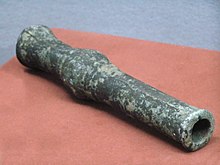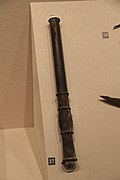Huo Chong

Huochong (simplified Chinese: 火铳; traditional Chinese: 火銃) was the Chinese name for hand cannons.[1] The oldest confirmed metal huochong, also the first cannon, is a bronze hand cannon bearing an inscription dating it to 1298 (see Xanadu gun).[2]
By the time of the Ming Dynasty (1368–1644) two types of huochong were in use. One was a hand held version with a wooden shaft known as a shouchong (手銃) whilst the larger Wankouchong (碗口銃 — bowl-mouthed cannon) or Zhankouchong (盏口銃 — cup-mouthed cannon)[3] rested on a supporting wooden frame. It was invented presumably as an advance in warfare, a new way to fight.
The Wankou Chong, translated literally as bowl-muzzle gun (Chinese: 碗口銃) was a type of Huochong gun used in the late Yuan and early Ming dynasties.[4][5] The cannons normally contained black powder, a wooden block or frame to contain the powder, and a large cannonball or a group of smaller cannonballs. The cannon was most commonly used to protect Chinese ports and to defend against pirates.[6][7] The cannon faded out of use gradually due to its short barrel, slow rate of fire, and short range.
Gallery
-
The Xanadu gun, 1298, is an example of a Wankouchong (碗口銃)
-
Bronze cannon with inscription dated the 3rd year of the Zhiyuan era (1332) of the Yuan Dynasty (1271–1368); it was discovered at the Yunju Temple of Fangshan District, Beijing in 1935. It is similar to Xanadu gun.
-
Replica of Ming dynasty cannons mounted on the opposite direction of a wooden frame, 1372.
-
Ming Bronze Gun, 1377 AD, Hongwu Emperor's reign.
-
Chinese hand cannon (Chong), dated 1424. Length 35.7 cm, caliber 15 mm, weight 2.2736 kg.
-
Ming copper cannon, 1450 AD.
-
A socketed Ming dynasty hand cannon, 1505, from the Zhengde Emperor's reign.
See also
- Hu dun pao, the term refers to trebuchet and cannon.
- Heilongjiang hand cannon, hand cannon, ca. 1287–1288.
- Xanadu gun, a bowl-mouthed hand cannon, 1298.
- Wuwei Bronze Cannon, late Western Xia (1214–1227).
- Gunpowder weapons in the Song dynasty
- Military of the Yuan dynasty
- Bedil tombak, Nusantaran hand cannon.
References
- ^ "Chinese Military Technology and Dai Viet: c. 1390-1497" (PDF). September 2003. Archived from the original (PDF) on September 20, 2010. Retrieved November 18, 2010.
- ^ "The World's Earliest Cannon (世界上最早的火炮)" (in Chinese). Archived from the original on July 23, 2011. Retrieved November 18, 2010.
- ^ Aung-Thwin, Michael Arthur (2011). New Perspectives on the History and Historiography of Southeast Asia: Continuing Explorations. Routledge. p. 83. ISBN 9781136819643.
- ^ "Chinese-style Firearms in Dai Viet (Vietnam) The". studylib.net. Retrieved 2023-03-23.
- ^ Duan, Weicong. "Ming China As A Gunpowder Empire: Military Technology, Politics, And Fiscal Administration, 1350-1620". wustl.edu.
- ^ "中国航海火器丨古代重型金属管型火器始祖——碗口铳_生活_澎湃新闻-The Paper". m.thepaper.cn. Retrieved 2023-03-23.
- ^ "洪武碗口銃(洪二十六)-數位典藏與學習聯合目錄(3049405)". catalog.digitalarchives.tw. Retrieved 2023-03-23.







